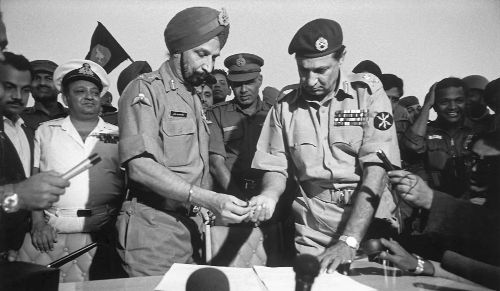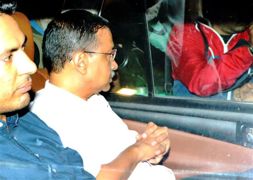
India’s Victory: The military planned, executed and won the 1971 war and when Dhaka fell, neither Indira nor Manekshaw flew in for a photo-op.
Fifty years is almost a lifetime, and the right time-span to look back at an event, particularly if the golden jubilee is that of a spectacular, unparalleled modern military victory. A poor nation of hungry millions, standing up to a warring sibling founded, armed and funded by a former Empire and a modern superpower, and yet achieving a stupendous victory against all odds is a chapter of history that we need to read many times over. With a Parsi Chief of Army Staff, Sikh and Jewish generals, a Muslim Assistant Chief of Air Staff and a predominantly Hindu force, the 1971 victory was that of a professional army completely oblivious to identity politics and its sinister sectarian manipulations. Every arm of the fledgling Indian state, be it spymaster RN Kao’s boys or BSF men and officers under KF Rustomji, worked like cogs in a big wheel which relentlessly rolled on, crushing the enemy’s genocidal, communal army, tearing Pakistan into two, redrawing the blood-soaked colonial map left behind by the retreating Empire, and rewriting the sad story of sub-continental fratricide.
Can we repeat the 1971 victory now? How many among the heroes of 1971 would have even chosen to remain in present day India? For instance, Royal Air Force’s ace pilot Idris Hasan Latif had rejected Jinnah’s Pakistan to choose Gandhi’s India, but would he do it all over again in an atmosphere filled with the fear of the unknown National Register for Citizens? What about Sam Manekshaw, JFR Jacob and Rustomji? Would they have preferred a more cosmopolitan London or New York or Melbourne to a strife-torn Indian city where youngsters remain anxious about their identity and farmers fight for their survival? These are important questions that we should ask as we start celebrating 2021, which will, hopefully, also be the Year of the Vaccine.
Another great lesson of the 1971 war was that it was fought after a general election and not before or for an election. Indira Gandhi won the Lok Sabha elections conclusively in March 1971, winning 352 seats out of the 518 that went to polls, and initially wanted the attack in April, but was turned down by the army — an instance of a no-nonsense military leadership and a listening political headship. The military planned, executed and won the war and when Dhaka fell in December, neither Indira nor Manekshaw flew in for a photo-op. It was left to the deserving Eastern Command chief to do the needful. Thus a new nation was born, which in its fiftieth year of founding stands tall and firm.
But India faced its biggest setback as a nation and a democracy thereafter. The very same leader who let the military and the bureaucracy do their job and refused to make political capital out of the moment of military triumph soon metamorphosed into a dictator, imprisoning Opposition leaders, imposing censorship, letting her son rule by proxy and postponing elections. So, is Indira’s makeover the real lesson of the 1971 victory — the emergence of a strong leader of a weak country? As a leader who changed the international map, creating a nation, and annexing new territory (Sikkim), Indira remains nonpareil in our annals; but she also took the nation into dictatorship and made us aware how fragile our democratic institutions are.
India craves for strong leaders — election after election. From Indira to LK Advani to Narendra Modi, we have had politicians trying to plug into this current of national yearning; some have succeeded and many failed. Yet, we refuse to acknowledge this sentiment, which often is mistaken for rightwing nationalism. A strong leader is the people’s cure for weak institutions of the functioning Indian chaos. The stronger the messaging about the messiah, the more receptive are voters for deliverance. Whether the promise is of politically-neutral development heralding prosperity through jobs and greater income, or the slogan is of a tougher national security state taking on enemies real or imaginary, voters seek out strong leaders who are seemingly in control. Of course, strong leaders have been defeated in the past when they lost the credibility of their messaging and the best example is the personal defeats of Indira and Sanjay along with that of their party in 1977. Yet, the chaotic Janata experiment only ended in the people turning to their tried and tested strong leader.
In September, it will be 75 years since the first interim government headed by Nehru took over the reins of governance to give ourselves the rule of law; yet India believes in the myth of the rule of the leader. This belief, though it is almost akin to the worshipful wait for the next avatar, cannot be dismissed as a pre-modern society’s superstitious angst. Had it been so, Indira would not have been voted out of power. The desire for the strong leader is a legitimate need for order — the quest for a super-arching authority to put the brute queue-jumpers in place, to create a more just society for the meek. This wish probably stems from deep insecurity over our inability to manage our own resources in small groups. The feudal hierarchy of the villages could not be solely blamed for this failure, for it is replicated in big cities that do not necessarily care for caste or communal pecking orders.
Indira succeeded in 1971 because she inherited a system that was still largely new in terms of its organisational integrity and idealistic in its intent. It was just 23 years after the Mahatma’s assassination and there was plenty of idealism in the air. But the present day strong leaders need to analyse whether they can repeat that feat while presiding over a people anxious about discord and dissension from within.
Join Whatsapp Channel of The Tribune for latest updates.




























